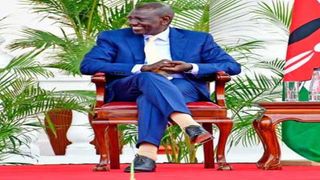
President William Ruto at State House, Nairobi on October 21, 2023.
| File | Nation Media GroupWeekly Review
Premium
Broke but extravagant: President William Ruto’s opulent image problem
Top politicians and senior government officials have continued to display opulence and extravagance in public at a time when the government is proclaiming austerity and can barely finance operations.
From expensive designer clothes, caps, shoes and accessories like wristwatches and belts estimated to cost millions of shillings, to carrying huge amounts of cash in public, the irony has not gone unnoticed by many Kenyans. The officials, led by President William Ruto, have also faced backlash for constantly travelling abroad and gobbling millions of taxpayers’ money while at it.
On Monday, a picture of President Ruto leaving State House to lead the Jamhuri Day celebrations at Uhuru Gardens, caught the attention of keen social media users—they pointed out that he was wearing a pair of Christian Louboutin red bottom shoes. Online checks indicated a pair costs Sh160,000 on average.
A few weeks ago, the President had sent tongues wagging with his distinctive Stefano Ricci belt estimated to cost Sh425,000. Many jokes were shared online about Kenyans being told to tighten their belts while their leaders were doing the opposite by wearing belts with eye-watering price tags.
The liberal use of multiple helicopters during events has also been the subject of scrutiny. For example, during the National Dialogue Committee sittings, a member of the talks team from the ruling alliance was flown in by a chopper to attend a session to discuss the high cost of living, among other agenda items.
Political analysts and opposition politicians say the display of opulence by those in the Executive and Legislature from the Kenya Kwanza Alliance paints the government in a negative light as it could be perceived to be a wastage of public money. Already, it has been pointed out that some of those in the spotlight could not afford such spending before they got into public office.

Stefano Ricci belt estimated to cost Sh425,000.
While their supporters argue that top officials and politicians must be presentable in public—and they are free to spend their money—critics point to a perception problem, saying the opulence is at variance with the austerity and “empty public coffers” message.
“It has become the norm for individuals to join politics to self-aggrandise. Join politics poor, leave rich,” says Prof David Monda, a political science lecturer at the City University of New York. “It is also normal and expected that when someone makes it in politics, they ‘bring the spoils home’, to their family, friends, village, region. This is then exemplified in the extravagance and conspicuous consumption by leaders in the public realm.”
Jubilee Secretary-General Jeremiah Kioni says State officers swimming in money during an economic crunch is a sign of wastage of public money.
“They think Kenyans are fools when they openly display opulence while they keep on talking about empty coffers. The opulence level can only mean high level of wastage,” says Mr Kioni.
Roads and Transport Cabinet Secretary Kipchumba Murkomen is among State officials who have become the subject of discussion over his supposedly lavish sense of fashion, with critics pointing to his love for expensive designer clothes, shoes and watches for evidence.
Speaking during the Masinde Muliro University of Science and Technology 20th graduation recently, Mr Murkomen made reference to his love for wristwatches, which he said started while in primary school.
“I saw on social media people debating on the shoe and watch I wear, but I asked my wife, is that me? Again I asked my sister, ‘Is it us who have made it to this level?’” said Mr Murkomen.
He went on: “Back in primary, I had a very beautiful watch. But getting that watch was very difficult because my father told me he would buy me a watch if I became number one in our class. I read so hard day and night and when the results came I missed number one by two marks. Out of sympathy, my father bought me a beautiful watch. I think that is where my love for beautiful watches started from.”
Kimilili MP Didmus Barasa defended those accused of extravagance, saying that there is no proof the monies come from their dealings with the government.
“Whether the government has money or no money, it does not affect individuals’ savings because people earn salaries and also have savings,” said Mr Barasa.
“It is not that the money they are carrying they have made from government dealings. I have seen people say so and so has a watch worth millions when he has always had it even before he assumed his current office. These people have been in other positions before,” he added.
Nyaribari Chache MP Zaheer Jhanda shared similar views saying that displaying wads of cash is not proof of corruption. He said some of the leaders are using their money to give back to society by supporting local football clubs in their constituencies.
Mr Jhanda said this in reference to images of UDA leaders carrying wads of cash to be dished out at a football tournament organised by Senate Majority Leader Aaron Cheruiyot.
Belgut MP Nelson Koech was photographed displaying the notes during the event. In a Facebook post, he disclosed that Mr Cheruyiot donated Sh3 million to one of the teams.
“People have salaries, people give huge amounts of donations in the form of cash to churches, that doesn’t matter at all. Choppers are means of travel just like buses and trains. The law does not stop anyone from displaying extravagance. It is a way of life,” said Mr Jhanda.
But in the face of all this opulence, the government through National Treasury Cabinet Secretary Njuguna Ndung’u has declared a cash crunch. So much so that Members of the National Assembly had to stage a walkout to protest delay in disbursement of Constituency Development Funds that are partly meant to support education through provision of bursary.
New road projects
Prof Ndung’u, while appearing before the National Assembly Finance and National Planning Committee, said the government was facing a serious liquidity challenge.
“In one year, Kenya has gone from one extreme, which is drought, to another, which is floods, and in both cases, we have allocated recurrent and development budgets to save lives because we have also not been able to collect enough taxes,” said the CS.
He added: “This administration is doing its best to ensure that we do not slide the country into insolvency. That is why we have to engage in a delicate balancing act with the available finances. The liquidity problem is in the short term.”
Similarly, Mr Murkomen said his ministry would not start new road projects, citing pending bills inherited from former President Uhuru Kenyatta’s administration.
At the same time, the President is seeking to have the position of Chief Administrative Secretary (CAS) anchored in law, a move that could significantly raise the public wage bill that stood at Sh970 billion as of June this year.
The government-sponsored National Government Administration Laws (Amendment) Bill 2023, seeks to amend the National Government Coordination Act of 2013 to establish the CAS position. Interestingly, the Bill does not cap the number of CAS positions, handing him a blank cheque for the appointment of as many CASs as possible.
His allies have, however, defended creation of the new office, saying they would make the government more efficient.
“When you do legislation, it is for prosperity because we will not be broke forever. The Cabinet Secretaries would need CASs to assist them discharge their duties effectively,” said UDA Secretary-General Cleophas Malala.





